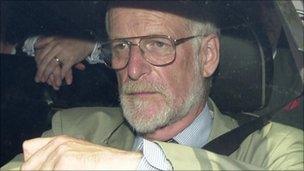New call for Dr David Kelly inquest
- Published

Lord Hutton found that Dr Kelly had committed suicide
A group of experts have renewed calls for a formal inquest into the death of government scientist Dr David Kelly.
They say the official cause of death - a haemorrhage - was "extremely unlikely" in the light of new evidence.
The claim comes in a letter from eight senior figures, including a coroner, published in the Times newspaper.
Dr Kelly's body was found in 2003 near his Oxfordshire home after he was exposed as the source of a BBC story on the grounds for going to war in Iraq.
Instead of a coroner's inquest, then Prime Minister Tony Blair asked Lord Hutton to conduct an investigation, which found Dr Kelly committed suicide.
Lord Hutton's inquiry found the 59-year-old died from blood loss after slashing his wrist with a blunt gardening knife.
Dr Michael Powers QC, a former coroner, is unconvinced Dr Kelly committed suicide
The letter's signatories include a former coroner, Michael Powers, a former deputy coroner, Margaret Bloom, and Julian Bion, a professor of intensive care medicine.
They say Lord Hutton's conclusion is unsafe. They argue that a severed ulnar artery, the wound found to Dr Kelly's wrist, was unlikely to be life-threatening unless an individual had a blood-clotting deficiency.
"Insufficient blood would have been lost to threaten life," they write.
"Absent a quantitative assessment of the blood lost and of the blood remaining in the great vessels, the conclusion that death occurred as a consequence of haemorrhage is unsafe."